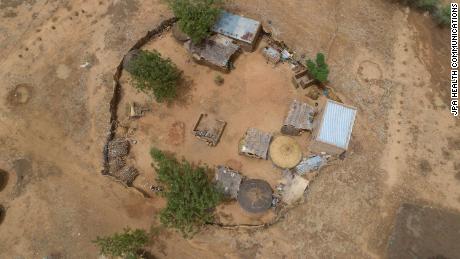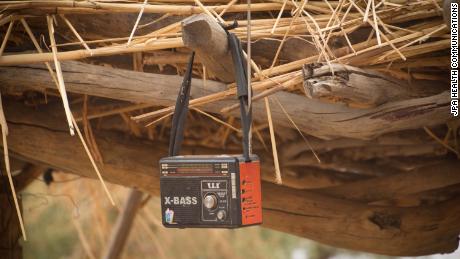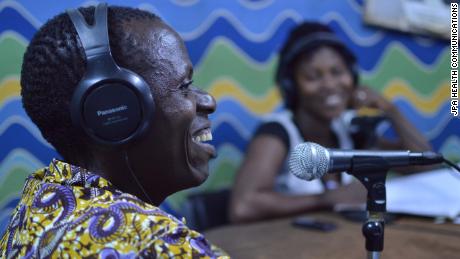An accompanying study showed that it is also one of the most cost-effective ways of saving children's lives. "The study showed that in the areas which received the radio intervention, there was an increase in the amount of children being taken to health facilities. In particular, that increase was for the conditions that were the focus for the campaign: malaria, diarrhea, pneumonia," said Simon Cousens, a professor of epidemiology and medical statistics at the London School of Hygiene and Tropical Medicine and one of the authors of the study. As governments around the world seek cost-effective solutions to health issues, the results of these studies — published Tuesday in the journal BMJ Public Health — suggest the role of mass media as a tool toward these ends.
Where child mortality remains high
While child mortality has been dropping around the world, it remains stubbornly high in sub-Saharan Africa, where 79 out of each 1,000 children will die before the age of 5, according to the World Health Organization. Three of the main culprits are malaria, diarrhea and pneumonia. Yet more than half of deaths in children younger than 5 are preventable through affordable and simple interventions, such as antibiotics and rehydration salts, according to WHO. And a key tenet of any prevention strategy is providing parents with information so they know when to seek care, according to the study.
The power of radio in rural areas
The radio campaign provided information to parents on what to do if their children developed symptoms of diarrhea, malaria or pneumonia. It was broadcast on seven radio stations — each with asignal radius of about 50 kilometers (31 miles) — between 2012 and 2015. Seven other radio stations served as control zones, in which the campaign wasn't broadcast. Because each radio station served a particular area of rural Burkina Faso, radio was the predominant form of information and TV was absent, the researchers could effectively and rigorously control for the effects of the radio campaign. In science-speak, it's a randomized controlled trial, and it allows for strong comparisons between groups.  "There have been many other studies of mass media campaigns, but most have been unable to use a randomized controlled trial approach due to the fact that their television broadcast contaminates any comparison areas," said Melanie Wakefield, director of the Centre for Behavioural Research in Cancer at the Cancer Council in Victoria, Australia, who wasn't involved in the study.
"There have been many other studies of mass media campaigns, but most have been unable to use a randomized controlled trial approach due to the fact that their television broadcast contaminates any comparison areas," said Melanie Wakefield, director of the Centre for Behavioural Research in Cancer at the Cancer Council in Victoria, Australia, who wasn't involved in the study.  The study showed that where the radio program was broadcast, the number of consultations at primary health centers for malaria, diarrhea and pneumonia for children under the age of 5 increased dramatically, up to 73% in one instance, underlining the effectiveness of information campaigns in changing certain behaviors. Using mathematical modeling, the researchers estimated that 3,000 lives had been saved as a result of the campaign."Mass media for behavior change is cost-effective, and it's particularly good when you just need information, when people don't know what to do: that this government program is available, this medicine is available, these are the symptoms of malaria," said Jennifer Sheehy-Skeffington, assistant professor of social psychology at the London School of Economics and Political Science, who wasn't involved in the study.
The study showed that where the radio program was broadcast, the number of consultations at primary health centers for malaria, diarrhea and pneumonia for children under the age of 5 increased dramatically, up to 73% in one instance, underlining the effectiveness of information campaigns in changing certain behaviors. Using mathematical modeling, the researchers estimated that 3,000 lives had been saved as a result of the campaign."Mass media for behavior change is cost-effective, and it's particularly good when you just need information, when people don't know what to do: that this government program is available, this medicine is available, these are the symptoms of malaria," said Jennifer Sheehy-Skeffington, assistant professor of social psychology at the London School of Economics and Political Science, who wasn't involved in the study.
What about everywhere else?
Yet outside of rural life, where radios still predominate, the potential of mass media as a tool to encourage positive behavioral health outcomes becomes ambiguous. "The fact that they've gone to such trouble to ensure that it's a captive audience raises some questions about how generalizable the results are," Sheehy-Skeffington said.  Where TV, the internet, radio and new forms of information technology compete for audiences, messages are diluted, complicating any study of the effects of mass media on behavior, she said. The results of the study are laudable, Sheehy-Skeffington said, but the continued economic development of countries — which generally entails the growth of media and technology — will likely preclude any scaling up of a similar project in most contexts.
Where TV, the internet, radio and new forms of information technology compete for audiences, messages are diluted, complicating any study of the effects of mass media on behavior, she said. The results of the study are laudable, Sheehy-Skeffington said, but the continued economic development of countries — which generally entails the growth of media and technology — will likely preclude any scaling up of a similar project in most contexts.
More complex issues require more complex strategies
Encouraging prompt care-seeking for parents with sick children is one thing, but many health issues — such as prenatalpractices and norms around HIV — are much more complex, requiring dramatic attitudinal changes, Sheehy-Skeffington said.It's unclear how effective a one-dimensional information campaign is in changing attitudes, according to Claudia Lopes, an affiliated lecturer in the Department of Politics and International Studies at the University of Cambridge who has worked on similar issues at the nonprofit Africa's Voices Foundation. "Mass media influences behaviors through a coordination effect. I.e., people want to participate only if the others also participate. Improving knowledge of attitudes is only effective in changing behavior if individuals perceive that others will change with them," Lopes said.
"Mass media influences behaviors through a coordination effect. I.e., people want to participate only if the others also participate. Improving knowledge of attitudes is only effective in changing behavior if individuals perceive that others will change with them," Lopes said. The most expedient way of changing norms and deeply ingrained behavioral patterns, according to Sheehy-Skeffington, is through two-way communication, which encourages a dialogue between participants and within the community. She cited Soul City, a development organization working across sub-Saharan Africa in HIV prevention, as exemplifying how to use mass media effectively in catalyzing behavioral change. That group is "on the cutting edge of trying to scale up mass media interventions in a way that's two-way, not just one-way, and really tries to engage people's lives on the ground, encouraging them to change the way they think about complex issues," she said.The science is still out on how to best use mass media to change behavior, according to Sheehy-Skeffington. But the results from Burkina Faso "adds to the body of evidence that mass media campaigns can change medical treatment-seeking," Wakefield said. The findings also highlight how "mass media campaigns can be a blue-ribbon investment for countries seeking to promote healthier behaviors."
The most expedient way of changing norms and deeply ingrained behavioral patterns, according to Sheehy-Skeffington, is through two-way communication, which encourages a dialogue between participants and within the community. She cited Soul City, a development organization working across sub-Saharan Africa in HIV prevention, as exemplifying how to use mass media effectively in catalyzing behavioral change. That group is "on the cutting edge of trying to scale up mass media interventions in a way that's two-way, not just one-way, and really tries to engage people's lives on the ground, encouraging them to change the way they think about complex issues," she said.The science is still out on how to best use mass media to change behavior, according to Sheehy-Skeffington. But the results from Burkina Faso "adds to the body of evidence that mass media campaigns can change medical treatment-seeking," Wakefield said. The findings also highlight how "mass media campaigns can be a blue-ribbon investment for countries seeking to promote healthier behaviors."
Original Article
An accompanying study showed that it is also one of the most cost-effective ways of saving children's lives. "The study showed that in the areas which received the radio intervention, there was an increase in the amount of children being taken to health facilities. In particular, that increase was for the conditions that were the focus for the campaign: malaria, diarrhea, pneumonia," said Simon Cousens, a professor of epidemiology and medical statistics at the London School of Hygiene and Tropical Medicine and one of the authors of the study. As governments around the world seek cost-effective solutions to health issues, the results of these studies — published Tuesday in the journal BMJ Public Health — suggest the role of mass media as a tool toward these ends.
Where child mortality remains high
While child mortality has been dropping around the world, it remains stubbornly high in sub-Saharan Africa, where 79 out of each 1,000 children will die before the age of 5, according to the World Health Organization. Three of the main culprits are malaria, diarrhea and pneumonia. Yet more than half of deaths in children younger than 5 are preventable through affordable and simple interventions, such as antibiotics and rehydration salts, according to WHO. And a key tenet of any prevention strategy is providing parents with information so they know when to seek care, according to the study.
The power of radio in rural areas
The radio campaign provided information to parents on what to do if their children developed symptoms of diarrhea, malaria or pneumonia. It was broadcast on seven radio stations — each with asignal radius of about 50 kilometers (31 miles) — between 2012 and 2015. Seven other radio stations served as control zones, in which the campaign wasn't broadcast. Because each radio station served a particular area of rural Burkina Faso, radio was the predominant form of information and TV was absent, the researchers could effectively and rigorously control for the effects of the radio campaign. In science-speak, it's a randomized controlled trial, and it allows for strong comparisons between groups.  "There have been many other studies of mass media campaigns, but most have been unable to use a randomized controlled trial approach due to the fact that their television broadcast contaminates any comparison areas," said Melanie Wakefield, director of the Centre for Behavioural Research in Cancer at the Cancer Council in Victoria, Australia, who wasn't involved in the study.
"There have been many other studies of mass media campaigns, but most have been unable to use a randomized controlled trial approach due to the fact that their television broadcast contaminates any comparison areas," said Melanie Wakefield, director of the Centre for Behavioural Research in Cancer at the Cancer Council in Victoria, Australia, who wasn't involved in the study.  The study showed that where the radio program was broadcast, the number of consultations at primary health centers for malaria, diarrhea and pneumonia for children under the age of 5 increased dramatically, up to 73% in one instance, underlining the effectiveness of information campaigns in changing certain behaviors. Using mathematical modeling, the researchers estimated that 3,000 lives had been saved as a result of the campaign."Mass media for behavior change is cost-effective, and it's particularly good when you just need information, when people don't know what to do: that this government program is available, this medicine is available, these are the symptoms of malaria," said Jennifer Sheehy-Skeffington, assistant professor of social psychology at the London School of Economics and Political Science, who wasn't involved in the study.
The study showed that where the radio program was broadcast, the number of consultations at primary health centers for malaria, diarrhea and pneumonia for children under the age of 5 increased dramatically, up to 73% in one instance, underlining the effectiveness of information campaigns in changing certain behaviors. Using mathematical modeling, the researchers estimated that 3,000 lives had been saved as a result of the campaign."Mass media for behavior change is cost-effective, and it's particularly good when you just need information, when people don't know what to do: that this government program is available, this medicine is available, these are the symptoms of malaria," said Jennifer Sheehy-Skeffington, assistant professor of social psychology at the London School of Economics and Political Science, who wasn't involved in the study.
What about everywhere else?
Yet outside of rural life, where radios still predominate, the potential of mass media as a tool to encourage positive behavioral health outcomes becomes ambiguous. "The fact that they've gone to such trouble to ensure that it's a captive audience raises some questions about how generalizable the results are," Sheehy-Skeffington said.  Where TV, the internet, radio and new forms of information technology compete for audiences, messages are diluted, complicating any study of the effects of mass media on behavior, she said. The results of the study are laudable, Sheehy-Skeffington said, but the continued economic development of countries — which generally entails the growth of media and technology — will likely preclude any scaling up of a similar project in most contexts.
Where TV, the internet, radio and new forms of information technology compete for audiences, messages are diluted, complicating any study of the effects of mass media on behavior, she said. The results of the study are laudable, Sheehy-Skeffington said, but the continued economic development of countries — which generally entails the growth of media and technology — will likely preclude any scaling up of a similar project in most contexts.
More complex issues require more complex strategies
Encouraging prompt care-seeking for parents with sick children is one thing, but many health issues — such as prenatalpractices and norms around HIV — are much more complex, requiring dramatic attitudinal changes, Sheehy-Skeffington said.It's unclear how effective a one-dimensional information campaign is in changing attitudes, according to Claudia Lopes, an affiliated lecturer in the Department of Politics and International Studies at the University of Cambridge who has worked on similar issues at the nonprofit Africa's Voices Foundation. "Mass media influences behaviors through a coordination effect. I.e., people want to participate only if the others also participate. Improving knowledge of attitudes is only effective in changing behavior if individuals perceive that others will change with them," Lopes said.
"Mass media influences behaviors through a coordination effect. I.e., people want to participate only if the others also participate. Improving knowledge of attitudes is only effective in changing behavior if individuals perceive that others will change with them," Lopes said. The most expedient way of changing norms and deeply ingrained behavioral patterns, according to Sheehy-Skeffington, is through two-way communication, which encourages a dialogue between participants and within the community. She cited Soul City, a development organization working across sub-Saharan Africa in HIV prevention, as exemplifying how to use mass media effectively in catalyzing behavioral change. That group is "on the cutting edge of trying to scale up mass media interventions in a way that's two-way, not just one-way, and really tries to engage people's lives on the ground, encouraging them to change the way they think about complex issues," she said.The science is still out on how to best use mass media to change behavior, according to Sheehy-Skeffington. But the results from Burkina Faso "adds to the body of evidence that mass media campaigns can change medical treatment-seeking," Wakefield said. The findings also highlight how "mass media campaigns can be a blue-ribbon investment for countries seeking to promote healthier behaviors."
The most expedient way of changing norms and deeply ingrained behavioral patterns, according to Sheehy-Skeffington, is through two-way communication, which encourages a dialogue between participants and within the community. She cited Soul City, a development organization working across sub-Saharan Africa in HIV prevention, as exemplifying how to use mass media effectively in catalyzing behavioral change. That group is "on the cutting edge of trying to scale up mass media interventions in a way that's two-way, not just one-way, and really tries to engage people's lives on the ground, encouraging them to change the way they think about complex issues," she said.The science is still out on how to best use mass media to change behavior, according to Sheehy-Skeffington. But the results from Burkina Faso "adds to the body of evidence that mass media campaigns can change medical treatment-seeking," Wakefield said. The findings also highlight how "mass media campaigns can be a blue-ribbon investment for countries seeking to promote healthier behaviors."
Original Article











